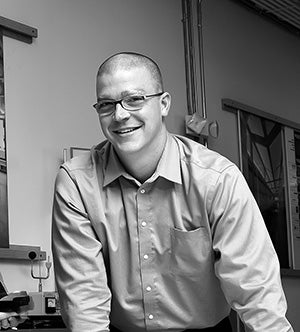The UO’s research lab on sustainable high performance buildings and healthy indoor environments welcomes a new director this month to lead the Energy Studies in Buildings Laboratories (ESBL) in Eugene and Portland. Kevin Van Den Wymelenberg, PhD, joins the award-winning lab after serving eleven years at the University of Idaho in a similar post. Van Den Wymelenberg was the founding director the UI Integrated Design Lab in Boise, Idaho. He takes over ESBL leadership from Philip H. Knight Professor G.Z. Brown, founding director, who returns to full-time research.

Above: Kevin Van Den Wymelenberg
“The Department of Architecture is very excited to be welcoming Kevin Van Den Wymelenberg to our faculty and to the directorship of ESBL,” said Judith Sheine, head of the Department of Architecture. “We are looking forward to Kevin continuing and expanding the remarkable legacy of research and consulting work that G.Z. Brown has led in ESBL and that has been such a critical part of the department’s reputation as the top-ranked architecture program in sustainable design in the US. Kevin’s own impressive record and plans for the future give us confidence that our department will continue to have a significant impact on sustainable design well into the future.”
The UO’s Energy Studies in Buildings Laboratory has developed and promoted innovative design strategies to improve human comfort and reduce energy use for more than 30 years. ESBL is devoted to creating buildings and communities that are more comfortable for people, require less energy to maintain and operate, and enhance the health and productivity of inhabitants.
ESBL was founded by G.Z. Brown, Philip H. Knight Professor in Architecture and Allied Arts, in 1977 when he arrived at the university as a faculty member. Since then Brown and his colleagues have conducted over $20 million in externally funded research and assisted owners of over l7 million square feet of buildings reduce energy use and improve design. In 2016, the department will recognize Brown’s contributions in a spring symposium and publication.
Van Den Wymelenberg expressed his appreciation and respect for Brown’s pioneering role in energy efficiency research and design.
“I want to acknowledge Charlie’s tremendous success at the lab. While completing more than $20 million in research over a 30-year period, he has provided leadership in several critical areas. I put the impact of Charlie’s work into at least three categories—all the residential efficiency and technology work with the US Department of Energy; all the commercial buildings work with NEEA (Northwest Energy Efficiency Alliance); and now for the last 5-7 years, the partnership with UO Biology studying the indoor microbiome. In each of those areas Charlie and his team have provided thought leadership for these important areas nationally. Many of us have ridden the wake made by that prow and built a successful career out of thought leadership that has come out of this place,” he said. “I look forward to working to carry it forward.”
The lab provides research and analysis of natural ventilation, daylighting, site and microclimate performance, as well as energy programming and other energy design assistance for architects, engineers, and building owners through laboratories in Eugene and Portland. It has worked with the leading architectural firms in the region to provide design assistance on some of the most innovative buildings in the world.
“There are exceptional firms across all of the Northwest, including Idaho, but in Oregon there are more firms aiming to design exceptionally high performance buildings. That fact, combined with Oregon’s tradition of sustainability, affords a unique platform to provide leadership in high performance buildings on a national scale,” says Van Den Wymelenberg, when asked about his reasons for joining the University of Oregon. “I see a tremendous opportunity to continue to push the envelope by working with firms here.”
Van Den Wymelenberg, associate professor, has a PhD in the Built Environment from the University of Washington. He teaches classes in daylighting, integrated design principles, energy performance in buildings, and design. Van Den Wymelenberg has consulted on several hundred new construction and major renovation projects with architects and engineers regarding daylight and energy in buildings since 2000. Five of these projects have been recognized with AIA’s Committee on the Environment (COTE) Top 10 Awards and many others are LEED certified. He has presented at conferences including the Illuminating Engineering Society, LightFair International, GreenBuild, and Passive Low Energy Architecture. He has authored several papers and two books related to daylighting, visual comfort, and low-energy design strategies.
Van Den Wymelenberg opened the Integrated Design Lab in 2004 for the University of Idaho and has successfully secured and completed over $7 million in grants for the Northwest Energy Efficiency Alliance, United States Environmental Protection Agency, Idaho Power Company, US Department of Energy, and several others.
Projects across the Pacific Northwest benefit from ESBL’s work including educational buildings on the University of Oregon campus such as the Lillis Business Complex as well as projects at Mt. Angel Abbey near Salem, and hospitals, schools, and commercial buildings across the country.
Additionally, the lab develops outdoor thermal comfort guidelines for building complexes and product development for new inventions such as a weather responsive shade control system, software products featuring energy design tools, and on-grade insulated panel floor systems, among others.
The Energy Studies in Buildings Laboratory facilities include a climate chamber, artificial sky, wind tunnel, and heliodon (a solar simulator) and other modeling and simulation tools. The lab is part of the Northwest Energy Efficiency Alliance’s Integrated Design Lab network with labs in Seattle, Portland, Eugene, Boise, Bozeman, and Spokane, created to promote energy efficiency in the commercial building sector. For more information, contact esbl@uoregon.edu or call 541-346-5647.
